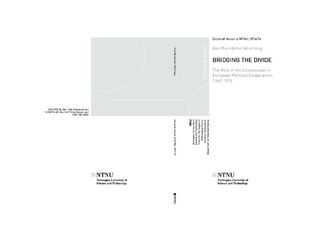| dc.contributor.advisor | Rye, Lise | |
| dc.contributor.advisor | Frøland, Hans Otto | |
| dc.contributor.author | Alterhaug, Ane Maritdatter | |
| dc.date.accessioned | 2016-04-13T14:10:56Z | |
| dc.date.available | 2016-04-13T14:10:56Z | |
| dc.date.issued | 2016 | |
| dc.identifier.isbn | 978-82-326-1487-5 | |
| dc.identifier.issn | 1503-8181 | |
| dc.identifier.uri | http://hdl.handle.net/11250/2385464 | |
| dc.description.abstract | Summary of the thesis:
This thesis investigates the European Commission’s approach to European Political Cooperation (EPC) from 1969 to 1976. Based on material from EU and state archives, the analysis demonstrates the resilience of supranational institutions in a period often claimed to be marked by the supremacy of intergovernmentalism following the 1965-66 empty chair crisis. By so doing, it sheds new light on the history of EPC and the history of European integration. The thesis also contributes to a wider theoretical debate on the role of supranational institutions in the integration project between neo-functionalists on the one hand and intergovernmentalists on the other.
In the period in question, the supranational features of the European Community (EC) were challenged. At the summit in The Hague in 1969, the Member States of the EC initiated an intergovernmental structure, an initiative that became the EPC structure from 1970. This structure, separate from the EC, was established in order to further cooperation between the Member States in the areas of foreign policy, and designed to prevent Commission involvement.
Based on in-depth studies of two cases, the Conference of Security and Cooperation in Europe, and the Euro-Arab Dialogue, the thesis establishes that the Commission nevertheless managed to acquire a role in the EPC. In so doing, the thesis challenges previous findings on the strict separation of the EC and EPC in this period. The thesis argues that the European Commission was far from being a weak and inconsequential supranational institution, wing-clipped due to the first generation Commission’s prior “violation” of the Member States’ sense of national sovereignty. Rather, a rational actor emerged, characterized by a pragmatic approach that to a certain extent gave the results it sought after, an actor that can be labelled a distinct second generation Commission. | nb_NO |
| dc.description.abstract | Sammendrag av avhandlingen:
Denne avhandlingen undersøker Europakommisjonens tilnærming til Europeisk Politisk Samarbeid (EPS) fra 1969 til 1976. Den baserer seg på materiale fra både EU- og nasjonale arkiver, og viser motstandskraften til overnasjonale institusjoner i en periode som ofte er beskrevet som overveiende mellomstatlig etter den tomme stols krise i 1965-66. Avhandlingen kaster slik et nytt lys over historien til både EPS og europeisk integrasjonshistorie. Videre gir avhandlingen et bidrag til en bredere teoretisk debatt om rollen til overnasjonale institusjoner i integrasjonsprosjektet mellom neo-funksjonalismen på den ene siden, og mellomstatlige teoriretninger på den andre.
I perioden som avhandlingen undersøker ble De europeiske fellesskapenes (EF) overnasjonale trekk utfordret. På toppmøtet i Haag i 1969 initierte medlemsstatene i EF en mellomstatlig struktur, et initiativ som resulterte i EPS-strukturen fra 1970. Denne strukturen var adskilt fra EF og ble etablert for å øke det utenrikspolitiske samarbeidet mellom medlemsstatene. En eksplisitt intensjon var å holde Kommisjonen utenfor.
Basert på dyptgående analyser av Kommisjonens tilnærming til to områder, Konferansen for Sikkerhet og Samarbeid i Europa og den Euro-Arabiske Dialogen, viser avhandlingen hvordan Kommisjonen fikk en rolle i EPS. Avhandlingen utfordrer dermed tidligere forskning som hevder at det i denne perioden var et skarpt skille mellom EPS og EF. Avhandlingen argumenterer for at kommisjonen var langt fra en svak og ubetydelig overnasjonal institusjon, vingeklippet etter Kommisjonen av første generasjons «krenkelse» av nasjonalstatenes suverenitetsfølelse. Snarere viser avhandlingen at en rasjonell aktør trådte fram, karakterisert av en pragmatisk tilnærming som til en viss grad gav Kommisjonen de resultatene den ønsket seg. Denne aktøren blir i avhandlingen karakterisert som en distinkt andre generasjons Kommisjon. | nb_NO |
| dc.language.iso | eng | nb_NO |
| dc.publisher | NTNU | nb_NO |
| dc.relation.ispartofseries | Doctoral thesis at NTNU;2016:74 | |
| dc.title | BRIDGING THE DIVIDE: The Role of the Commission in European Political Cooperation, 1969-1976 | nb_NO |
| dc.type | Doctoral thesis | nb_NO |
| dc.subject.nsi | VDP::Humanities: 000::History: 070::Political history: 071 | nb_NO |
